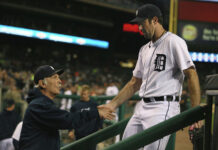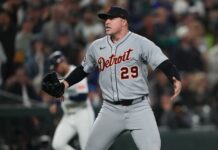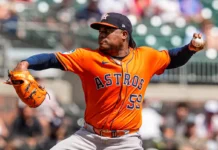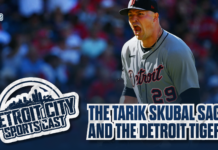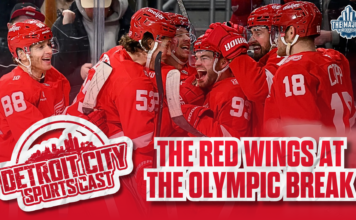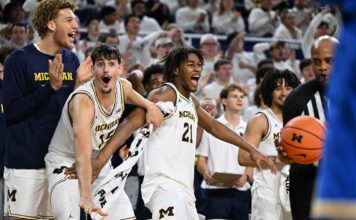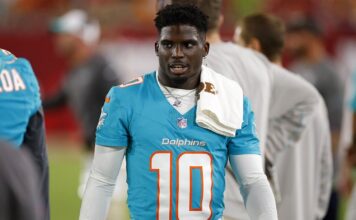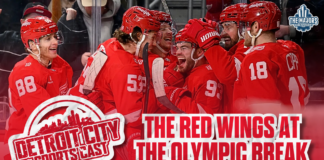Tonight, we will finally learn the MVP of the American League, a contest that really comes down to two candidates in Miguel Cabrera of the Detroit Tigers and Mike Trout of the Los Angeles Angels.
For the majority of the 2012 season the debate raged on who should ultimately take home the prize with traditionalist seemingly siding with Cabrera while the sabermetric junkies simply fell in love with Trout’s eye popping stats… and for good reason. But what most people tend to forget in this debate, including those in the Baseball Writer’s Association of America (BBWAA) who get the final say is the actual premise of the Award which is the most valuable player.
Last season I was a huge proponent that Justin Verlander deserved the AL MVP because he truly was thee most valuable player to the Tigers’ organization. Sure his stat line was different than that of Jacoby Ellsbury but if you took Verlander out of the Tigers’ rotation you could make a good case that the Tigers don’t make the playoffs last season, despite their late season run. And in the end the writers got it right awarding Verlander the honors instead of not necessarily the most exceptional player (which you could argue Verlander was as well).
Fast forward to this season though and the debate get’s a little murky. Both Cabrera and Trout were hugely valuable to their respective teams and very much dictated what success the teams did have. Something that can’t be taken into account though was what happened before this season or what will happen in years to come. The 2012 AL MVP should be based on just that, what happened in 2012 between these two very impressive players.
MIKE TROUT
Stats, stats, stats:The traditionalist seem to hate this category but baseball is very much a stats driven game so it would only seem appropriate that Trout’s stats should without a doubt present a very good case for his AL MVP argument. In only 139 games played the 21-year-old hit an astounding .326 (second behind Cabrera) with 30 home runs and led the majors with 49 steals and 129 runs scored. It makes you wonder what those stats would look like if he played in all 161 games during the season, again something you really can’t penalize him on.
Defense: Sure Cabrera was serviceable at third base in 2012, Trout on the other hand was phenomenal in center for the Angels. He possessed a .988 fielding percentage and a UZR of 1 which helped the Angels become one of the best defensive outfields in the American League.
Trout’s run in 2012 also made the WAR stat a household term… which most people don’t understand the idea of despite it still being important.
Where would the Angels’ of ended up with out him in 2012? Mike Trout’s presence in 2012 enabled the Angels to be relevant at the end of the season. Given the struggles of the rest of the team, especially Albert Pujols, Trout carried the organization on his back giving the Angels the opportunity to remain in the hunt in September. And in a tough AL West nonetheless.
MIGUEL CABRERA
Triple Crown: Even though not every Triple Crown winner has ended up winning the MVP, there has to be some sentiment to Miguel Cabrera being the first player since Carl Yastrzemski in 1967 to win the Triple Crown. Cabrera finished the season with American League leading number in home runs (44), RBIs (139) and batting average (.330).
Mike Trout certainly has his impressive numbers but Cabrera has his as well.
Switching positions: Not a whole lot is put into this but it should. Miguel Cabrera, who is baseball’s BEST hitter (yes better than Albert Pujols) offered to switch positions during last offseason so the team could pursue Prince Fielder and put him at first. Prior to his move, Cabrera had worked himself into a good defensive first baseman and yes he wasn’t nearly as good as Trout was defensively but worked equally as hard to put his third base critics to bed in 2012.
The Tigers were a better team this past season because of Fielder and Cabrera going back-to-back in the lineup, something that may of never of come to fruition if Cabrera didn’t make the move.
The Tigers got to the playoffs: What should be important in voting for this award, but probably still isn’t is whether or not the players respective team made it to the postseason. Simply put, Cabrera and the Tigers made it to the postseason (and eventually the World Series) while Mike Trout and the Angels were golfing. And it was Cabrera’s monster numbers in the month of September that helped propel the Tigers past the White Sox and into October baseball.
Like Mike Trout, where would the Tigers be without Cabrera?

